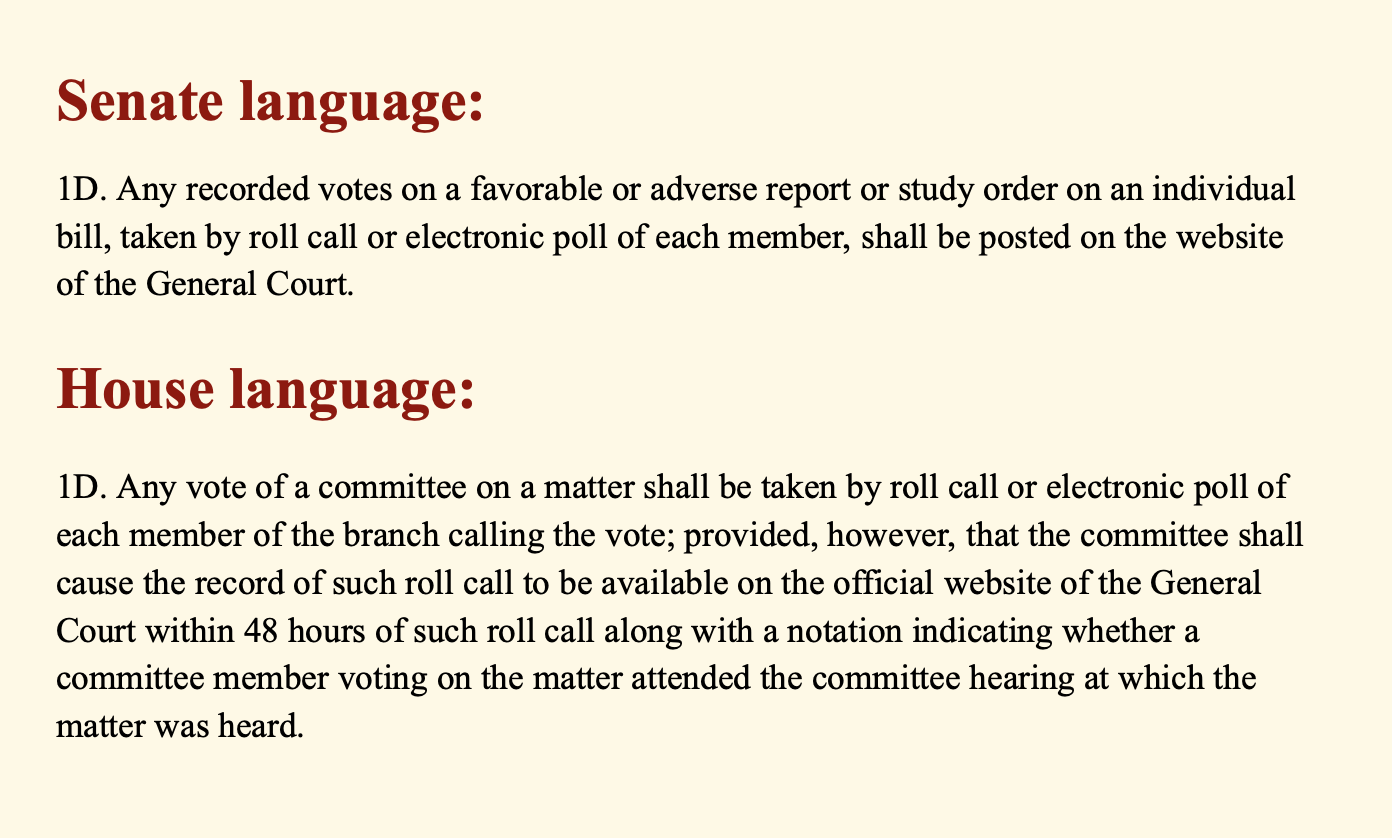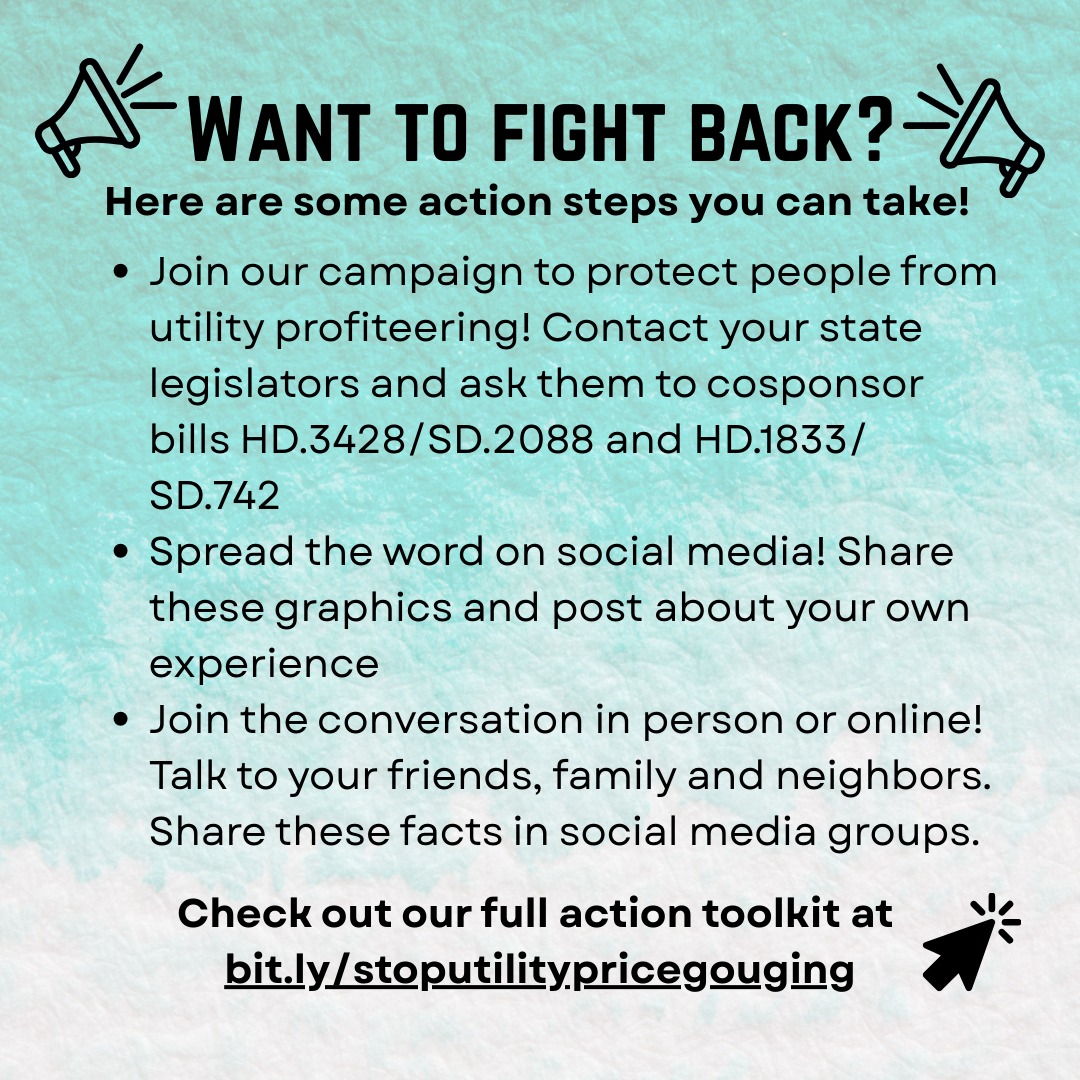Happy Saturday,
Even after (almost) a lifetime of living in New England, I always have to remind myself not to be fooled by weeks like these. These are the days when spring visits, but doesn't stay. Beware, I tell myself, sub-zero temperatures will return! Do not put your parka away!
And still, what a treat to enjoy those few extra rays of sunlight... those 40º days that feel almost like mid-July.
It's a thawing-out that almost mimics some changes in our state legislature that have happened in recent weeks, with rules reforms that might just let a little more sunlight slip in. And just like these winks of early spring, they can and should be met with a healthy dose of excitement– and a reasonable dollop of skepticism.
Last week we talked about how the sausage was made. This week, we’re going to talk about the sausage itself. Like I said last week, although we’ve seen the Senate rules already, the House has tended to be more resistant to transparency reforms, making the House rules somewhat of a “high water mark” for the overall transparency we can expect from a legislative session.
So, read on for: House rules proposal deep dive, some of the takeaways from committee assignments last week, and a great Syd's Sprinkles on those high energy bills we're seeing and what our leaders are doing about it. Let’s get to it!
---
State House Scoop
House rules deep dive: public committee votes + more!
We’ll start with the undeniable “main character” of the transparency debate in the last few years: public committee votes.
Apparently, I was not the only one flabbergasted to hear that the House was planning to concede on making committee votes public. Said sitting Rep. Christopher Hendricks: “I just always thought that was a hard line the House was going to dig into.”
Me too, Rep. Hendricks. On that note: you’ve got to wonder what led to a change of heart from all the “progressive” representatives who have made passionate speeches against public committee votes over the years– only to vote for them as soon as leadership approved it.
First, a quick reminder of why public committee votes could be such a big deal. In recent years, we have seen a significant decrease in recorded votes taken on the floor of the House and Senate. At the same time, more and more lawmaking is being done with massive omnibus bills, where tens and even hundreds of policy changes are combined into a single vote, making it harder to identify our reps’ positions on a particular issue. The overall result is that constituents are left with very few meaningful insights into how the people who represent them actually feel about issues that are important to them.
With fewer votes on the floor and almost no debate, this means most of the meaningful work of lawmaking done by rank-and-file reps is done in committee. And up until now, that work has been completely hidden from the public.
Now, after years of resistance to repeated public pressure to make committee votes public, House leadership said that they intend to implement this reform. This would be a huge victory for our movement and a significant step forward for allowing the public access to the work of lawmaking. However, the language actually used in the package has us holding off on celebrating– for now.
For one, the House package uses language that differs significantly from the Senate proposal. If House leaders were committed to implementing this reform and being done with it, it could be easily accomplished by using the same language as the Senate did. Now, the difference between the two will have to be worked out in conference committee.

We like that the House language, unlike the Senate’s, sets a clear deadline for the publication of these votes. Yet, the House language appears more vague than the Senate, which is clear that votes on favorable, adverse reports, and study orders must be made public. Additionally, it seems to lack clarity on whether electronic polls are included– which is how most votes are taken these days.
Furthermore, there is another section of the House Joint rules that we worry could create a significant loophole on committee votes. It’s wrapped into a proposal that we actually quite like: imposing a rolling deadline for action on bills. This House proposal, which was not included in the Senate rules, seeks to improve upon the Joint Rule 10 deadline by requiring that all bills get a committee report within 60 days of their public hearing, with the possibility of a 30-day extension. This would hopefully speed up the committee reporting process, which can lag many months or even full years beyond the hearing process, making it difficult for the public to follow and remain engaged.
However, the House language clarifies that any bill which does not see action within this 60-day period would automatically be sent to study. We worry, then, that commitment-shy representatives might be able to avoid taking positions by simply running out this short clock on bills.
The House joint rules proposal also includes language that would make public testimony public and require plain-language bill summaries to accompany all bills, with language that also differs slightly from the Senate’s. These differences will also have to be sorted out in conference committee.
With the two versions of Joint Rules now public, we have two priorities:
- Ensure that House and Senate actually agree on joint rules, which they haven’t been able to do since 2019. If they cannot come to an agreement on a compromise package, we might get none of these changes
- Ensure that, between the two versions, they pick the language that most improves public accountability and transparency
To that end, we got together with a couple of the organizations that joined us for our January joint letter to legislative leaders to write a new letter to the newly-named members of the Joint Rules conference committee. We give our recommendations for what proposals should be adopted between the two versions. You can read that letter here.
We’re inviting folks to take action towards these goals with us by writing an email to your own legislator expressing your support for these reforms. You can find guidelines here:
Better late than never: committee assignment takeaways
Now for the other big news of last week……… we have committees!!!!!!!!!!!!!!!
Never mind that our peer states are already passing legislation in formal session– better late than never to start the work of lawmaking and crafting our state’s policy response to the Trump-Musk crisis, am I right?
With the loyalty tests of last week behind us, Speaker Mariano and President Spilka let their benevolent favor fall upon their membership… with some, obviously, making out better than others.
First, we should point out what didn’t change at all: fake committees. Reporting by the Boston Globelast year first drew attention to these phantom committees, which boast official-seeming names and official-seeming chairs and co-chairs (who are duly paid their lucrative leadership stipends), yet seem to do little of the work of actual committees. That is to say, 12 of these committees across House and Senate did not host a single hearing last session, nor consider a single bill.
We know that each of these committees-in-name-only do serve a purpose for state house leadership: adding one more $$$ stipend for leadership to dole out to keep people in line. Every extra stipend counts in a system where 109 House members and all 40 Senators are dependent on leadership for a significant portion of their salaries– and act like it.
Despite additional attention to transparency and accountability, all 12 of those committees were reintroduced this year. Reporters asked Rep. Bud Williams– who will receive an additional $22,431 annually to chair a committee that has not held a hearing since 2021 and has never considered a bill– whether his committee might see more action this year. Said Rep. Williams: “we’ll just have to wait and see.” Alright!
Moving along to the committees that do consider meaningful legislation– namely, the joint committees– this year’s assignments saw a lot of the same, with a few shake-ups.
In a legislature of 200, members take office with a variety of expertises, work backgrounds, and policy interests. Indeed, there are a number of strong arguments in favor of keeping members on the same committee for years in a row (if they’re re-elected of course, which– in Massachusetts– is almost everyone.) Multiple years of experience in the same policy area allows members to develop policy expertise, build relationships with advocacy groups, and gain a working familiarity with the types of laws that the committee deals with.
However, having a well-informed membership with specialized policy backgrounds makes it difficult to maintain the sort of tight-grip control that is characteristic of leadership in our Legislature. Informed chairs are empowered chairs. So, leadership has a practice of playing musical chairs with certain favored… well, chairs. This practice ensures that loyal members maintain the same stipends, but interrupts the accumulation of knowledge or informal power. For rank-and-file members, it maintains a system where the path to leadership in your policy area of choice is not through building and exercising expertise in that area, but currying favor.
This term has a fresh new example: Representative James Arciero, who’s been through this process before. In 2021, Rep. Arciero was named Chairman of the legislature’s essential Joint Committee on Housing– despite having "never worked in that space before.” After two sessions on Housing, Rep. Arciero and transportation advocates alike were “surprised” last week when he was named Chair of the Joint Committee on Transportation.
No shade to Rep. Arciero, who is planning a statewide “listening tour” to build up his background on transportation. Still, there are certainly other members of the 160-person House who have more background in transportation– such as any one of the 7 re-elected Democrats from last session’s transportation committee.
In a surprising moment of “saying the quiet part out loud” last month, Speaker Mariano said that he wants to “empower” chairmen and members this session: to have them “have them involved in the decision-making, rather than taking it all out of the speaker’s office.” We are hoping that is still the plan. But, old habits die hard…
Also worth reading!
Shameless plug for an op-ed piece with some names you might recognize!
- Some hopeful signs, but still a long way to go on legislative transparency (Opinion) by Jonathan Cohn, Peter Enrich, and Scotia Hille in Commonwealth Beacon
--
Become a Scoop sustainer

The Saturday Scoop is a free newsletter that recaps the previous week on Beacon Hill. We will always keep the Scoop free, but it is not free to run.
Become a Scoop Sustainer today to help subsidize the Scoop and keep it free and sustainable for all.
--
Missed a Scoop or two? You can find a full archive of all past Saturday Scoops on our blog.
---
Syd's Sprinkles
Syd’s Sprinkles: Mass Save’s Budget Cut
In his first months in office, Trump has targeted various areas ranging from immigration to scientific research to diversity, equity, and inclusion. Another of these areas is our economy.
The results of Trump’s tariffs on our three closest trading partners – China, Canada, and Mexico – are going to be another addition to the high costs we are already burdened with.
In an effort to lessen extremely high energy costs this winter, the state has announced cuts to Mass Save – an energy efficiency program which saw over $30 billion in savings since its beginning in 2013.
The use of Mass Save as a scapegoat is only beneficial to those who benefit from the economic models that do not only support less efficient energy services, but which continue to harm the environment and simultaneously bill customers for services that they may not realize they are paying for.
Due to these high costs and their effects on people across the state, Healey has said that she intends on addressing the high costs of living in the state during a Greater Boston Chamber of Commerce forum.
During the forum, Healey said that the state “will jump-start homegrown, clean energy generation, which is the key to protecting against future volatility and price spikes...”
But what does that mean?
As of right now, the answer to that question is unclear. With the constituents, legislators, and even the Department of Public Utilities which provides Mass Save’s budget still calling for changes to the program and additional options to strengthen the state’s clean energy sector, Healey clearly has many voices to consider when deciding what her executive action to address costs will entail.
The increase in energy costs is not a result of Mass Save as some have tried to argue.
Rather, according to research scientist Dorie Seavey, there are three other reasons why energy costs were so high this winter:
- Fluctuations in gas prices
- Increasing costs of delivery
- Lack of transparency in utility bills
While it is true that Mass Save prices have risen, they are far from the sole contributor to an increase in price. For one, this winter was the coldest one since 2015. Meanwhile, utilities CEOs rake in even more in profit: the CEO of Eversource, a major MA utility, is currently the 9th highest paid utility CEO in the nation at a cool $18 million.
In cutting down the budget for the program now, as some have argued for, the results later on will be even more costly for Massachusetts residents.
The original budget of $5 billion for Mass Save has been cut down to $4.5 billion for the next three years.
$500 million may not seem like a lot when it comes to numbers in the billions, but for this program and its initiatives it does make a difference. For one, the Department of Public Utilities has given the utilities in the program (e.g. Eversource, etc.) the freedom to decide where the budget cuts will come from. This puts important aspects of the program at risk, such as those which coordinate efforts to bring efficient energy to marginalized and low-income communities.
Climate and environmental specialists have argued that while it is unfair for ratepayers to be the sole contributors to a program meant to further climate action and energy efficiency in the whole state, there is a need for alternative ways to supplement the funding that Mass Save has lost via avenues such as funding from the legislature. Without adequate funding, the state’s goals for sustainability and climate action are at risk of being undermined at a vital time.
But there is still hope, which comes in the form of Mass Save still being one of the biggest energy efficiency programs in the country. With alternative funding sources, the state can carry on with its own initiatives to reduce costs for residents while simultaneously strengthening an industry that is dedicated to forging a better future for the environment as well, regardless of Trump and his administration's attempts to undermine efficient and clean energy in the name of fossil fuels.
In the meantime, stay tuned for the May 1st deadline to hear about where Mass Save’s budget cuts will end up coming from. And scroll down to our “Take Action” section for some steps you can take right now to make sure that high rates are not passed on to consumers.
---
Take Action
Tell the Joint Rules Conference Committee: Pass Joint Rules!
Take action to ensure that we get a joint rules agreement this year that maximizes public participation and accountability. Email your representative:
Tell your rep: cut corporate profits, not Mass Save!

Our friends at the campaign to "Protect People from Utility Profiteering" have put together a great action guide to demand that our elected representatives take action on high utility bills & corporate profits. Click to take action!
Save the Date
Sunrise Boston: How to End an Oligarchy Teach-In - Sun. March 9, 2-4:30 pm

Join our allies at Sunrise Boston for a teach-in tomorrow on the action steps we can take to fight the current billionaire takeover of our federal government.
ATTEND HOW TO END AN OLIGARCHY>>
Mass Alliance Grassroots Campaign Training

Fed up with federal uncertainty and the lack of leadership from state officials? Ever thought about running for office or helping someone get there? Consider attending Mass Alliance's 2-day bootcamp campaign training, which will cover the necessary skills for running a grassroots campaign for public office. Come to learn the ropes from experienced campaign operatives, organizers, and elected officials, for a fee of $125.
SIGN UP FOR GRASSROOTS CAMPAIGN TRAINING>>
---
That's a wrap! Thanks for reading and thanks for taking action. Proud of this movement and what we've accomplished so far– and everything yet to come!
In solidarity,
Scotia
Scotia Hille (she/her)
Executive Director, Act on Mass
